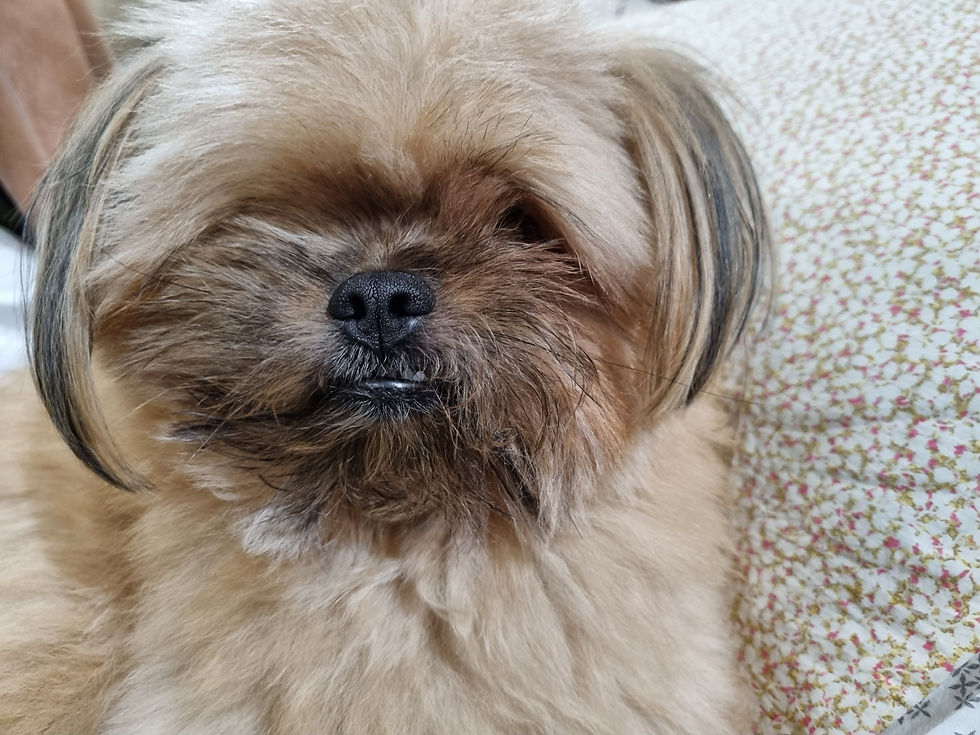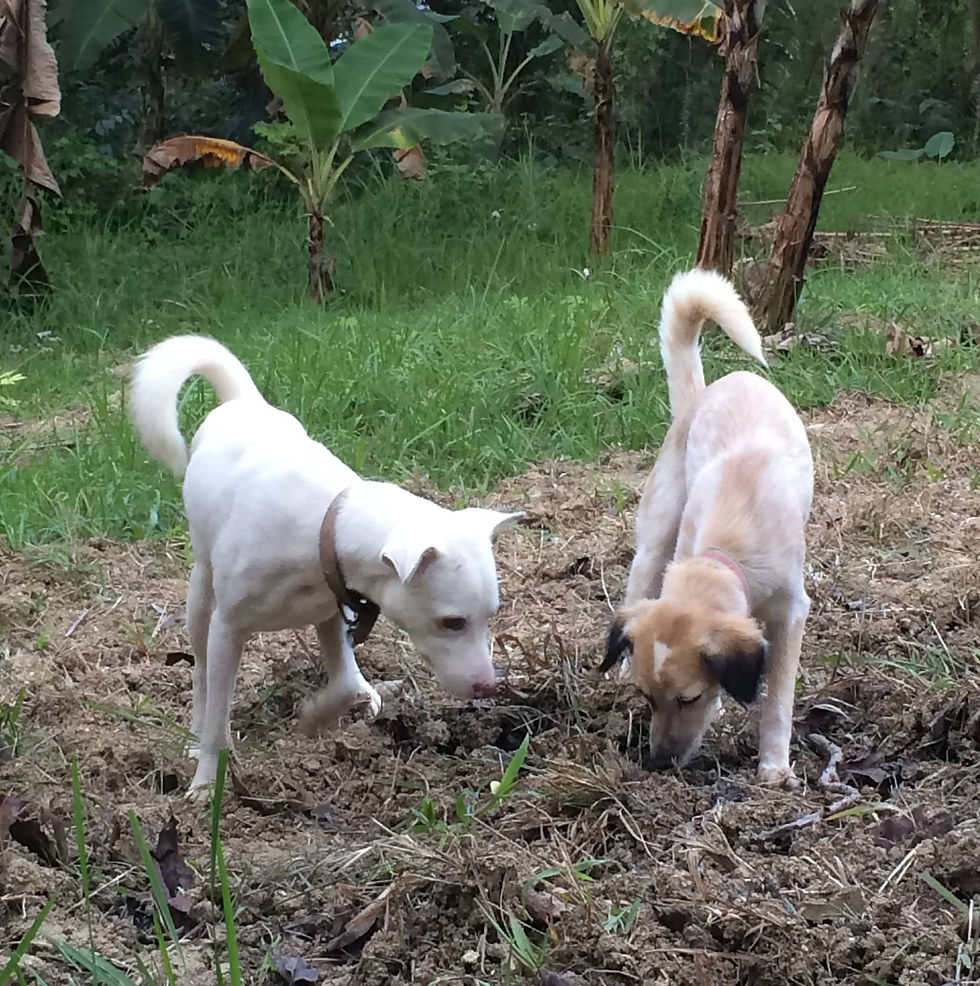A Special Kind of Bond: Living with Pets with Disabilities (PWDs)
- Rachel Ann Romo

- May 14, 2022
- 6 min read
Updated: May 15, 2022
Dogs hold special places in our hearts. I can personally attest to that as our family currently owns five dogs. However, there is only one among them that lives with us inside the house. It’s not because of his breed or because he’s our favorite (which I don’t deny) but because of his special circumstance.
Our shiranian (Shih Tzu-Pomeranian) dog named Pom Pom has been with us since he was only a few months old. Even before he came home with us, he had already captured our hearts. Pom Pom was born with complete, functioning body parts. That was until a few months later, he got an eye laceration that got infected which required him to have it removed as per the veterinarian’s advice. This may have been a difficult ordeal for our family, yet, Pom Pom is now happily walking around the earth albeit with one less eye.

Photo from Rachel Romo
One of a Kind
As someone who has been taking care of a Pet with Disability (PWD) for over three years now, I know how challenging and rewarding it is to be with a pet that requires more than just the usual tender love and care that they need. And I’m sure, many other pet owners share the same sentiments with me.
Janica Pahayahay has had her pet dog, Reebok—a cross breed between an aspinlabra (Aspin-Labrador) and Japanese spitz—for over three years now. She shares that they weren’t supposed to get this dog in the first place as it was previously owned by someone else. But, because of the severe tick and flea infection Reebok had, his almost owner decided not to go through with his adoption, which ended up with Reebok going home to Janica’s family instead.
But what makes this comPAWnion unique is not because of how Janica got around to having him, but because Reebok is actually born deaf.

Photo from Janica Pahayahay
“We don’t know much about his mother’s background, but I’m guessing he got it from her,” Janica said when asked about the history of Reebok’s hearing impairment. “[When] my father asked the owner of the Japanese spitz if it was okay to bring him [Reebok] to our house…we didn’t know at the time that he has [a] disability,” she added.
Similar to Janica’s plight as an owner of a PWD, another pet owner shares how his winged, feathered friend also challenged his patience in tending to its special needs.
Earl Almagro has been a bird enthusiast since he was a child and has had over ten birds under his care. One of them is an Indian Ringneck Parakeet, Rio, which he named after a famous city in Brazil. He has been taking care of Rio for almost two years now.

Photo from Jaeson Almagro
Earl shares that he has been dreaming of having a medium-sized bird as a pet. “I found [Rio] on a Facebook page that sells different kinds of parrots. I took the risk and drove from the city to a place in the north [of Cebu] that I am not familiar with, despite the scorching heat of the sun.”
However, after a few training sessions with Rio, Earl discovered that this particular bird suffers from an unhealthy plucking behavior. “I’m not certain how my pet got his disability but based on my research it could be caused by stress due to change in environment, boredom, lice, or itchy skin. As a result of plucking his own feathers, it’s difficult for him to fly because of the lack of feathers,” Earl narrated.
Another animal lover, Chloe Veloso, shared her experience with taking care of a shorthair rescue cat that she fondly calls Mr. Mistoffelees or Mistoff for short. This stray puspin in a ‘tuxedo’ has been her best furend for over six years now after he endearingly followed her all the way home from a quick errand. “I couldn’t resist the thought of being escorted home by a cutie in a tuxedo. The rest, as they say, is history.” Chloe said.

Photo from Chloe Veloso
She shares that when Mistoff was rescued as a kitten, he already had a serious eye condition. “Several veterinarians prescribed eye treatments, but they were ineffective, and one veterinarian concluded that Mistoff’s eye condition was most likely inborn,” she said.
However, as Mistoff grew into an adult cat, Chloe realized that he is not totally blind after observing that he still responds to changes in lighting, and can still jump on and off low surfaces.
A deaf dog, a bird struggling to fly, and a semi-blind cat—how hard can taking care of these pets be?
The Added Struggle
Many pet owners have stressed how it’s not easy to care for a pet. When you have a pet with a physical disability, this makes the challenge much more difficult.
Janica shares that the difficulty of taking care of Reebok is his hearing disability which led to a couple of accidents. “[Reebok was] hit by a car twice when we let him out for a walk on his own. [This is] because he can’t hear and can’t notice if there’s a car behind him.” These incidents resulted in an injury on Reebok’s hind legs.
Aside from that, looking for Reebok during feeding time is also another challenge that Janica constantly faces as he is usually nowhere to be found. “We have to go find him because there is no sense of calling him,” Janica said.

Photo from Janica Pahayahay
However, despite these obstacles, Janica has never once thought of giving up on Reebok even with his disability. “I adore dogs regardless of their disabilities, and I love my own dog as well. He motivates me to work harder towards my goal of becoming a veterinarian,” she shared.
On the other hand, Earl’s biggest struggle of taking care of his pet bird is helping him recover from the disability he developed. This has stressed Earl as a pet owner, and had him almost trading Rio for a different bird. “Personally, I got discouraged and disappointed for him, because finding a cure for a plucking bird takes a lot of patience, effort, and it’s a trial and error phase.”
Despite this, Earl chose to overcome this by taking on the difficulty of taking care of a PWD. He shared that Rio is already a part of him and that he didn’t want to be the kind of person who “walks away from their pets when [things get] tough.”

Photo from Jaeson Almagro
Meanwhile, things are seemingly different for pets with eye defects as their limited sight affects how they move around in certain spaces. For Chloe, pet-proofing her room for a semi-blind cat is what she considers her biggest challenge as a pet owner.
However, because their bond goes all the way back to when he was still a kitten, Chloe has never once entertained the idea to stop caring for him, much less, consider letting him go. “Mistoff chose me as his human by following me home,” she said.
More than Just Their Disability
In the end, what makes our pets special is how we see them with our own eyes. Pets with disabilities are, undeniably and literally, special in their own ways. And PWD owners are more than lucky to be able to share their lives with them.
Janica expressed that for a pet like Reebok who is deaf, physical touch is critical for them to feel loved and appreciated. “Even if he can’t hear, he understands us when we call him by sign language, and he clings a lot when he gets to know the person,” she said.
Meanwhile, Earl said that Rio is special to him because he is his first and only medium-sized bird. Despite his disability, Earl takes pride in Rio for being a “very talented bird” having been able to learn a few tricks like whistling.
Video from Jaeson Almagro
On the other hand, Chloe expressed that Mistoff is special in his own way as he has a “more heightened sense of hearing and smell than [their] other cat, who has no special needs.”
Different Kind of Love
As pet owners, Janica, Earl, and Chloe proved how providing consistent love and affection for PWDs, in spite of the taxing job of meeting their basic needs on top of their special needs, can go a long way.
Janica advised pet owners with PWDs to “allow them to feel special despite their disabilities.” Earl echoed this by encouraging pet owners to not give up on taking care of them albeit it being challenging and disappointing at times.
Meanwhile, Chloe stressed how responsible pet owners must provide love and care for their pet’s health, safety, and wellbeing “regardless of whether it is a regular pet or a special needs pet, a pure breed pet or a mixed breed pet.”

Photo from Chloe Veloso
The COVID-19 pandemic has given many pet owners the opportunity to spend more time with their pets at home. For others, they have taken the responsibility of caring for a pet for the first time. While many would prefer taking care of pets that don’t require any special demands like PWDs, these animals need our help more than any other.
It may be double the struggle of taking care of PWDs, but it is also a fulfilling responsibility.
.png)






Comments